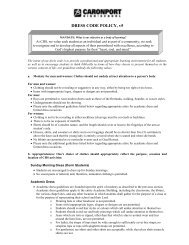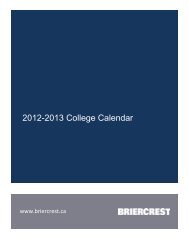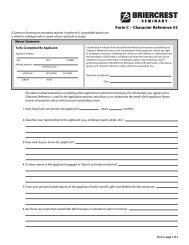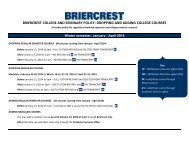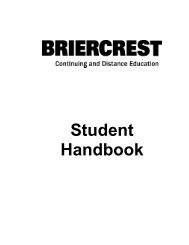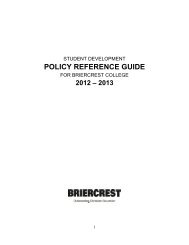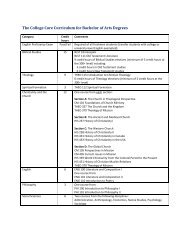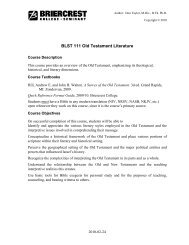CHILD PROTECTION POLICY - Briercrest College and Seminary
CHILD PROTECTION POLICY - Briercrest College and Seminary
CHILD PROTECTION POLICY - Briercrest College and Seminary
Create successful ePaper yourself
Turn your PDF publications into a flip-book with our unique Google optimized e-Paper software.
<strong>Briercrest</strong> <strong>College</strong> <strong>and</strong> <strong>Seminary</strong> will work with volunteers to identify the appropriate supervisor<br />
specific to their placement <strong>and</strong> level of involvement.<br />
<strong>Briercrest</strong> <strong>College</strong> <strong>and</strong> <strong>Seminary</strong> values the continuous development <strong>and</strong> learning associated<br />
with intentional reflection, personal accountability, <strong>and</strong> ongoing consultation with supervisors.<br />
Employees <strong>and</strong> volunteers should regularly consider the following questions:<br />
What things could be potential risks<br />
What is the probability that something will go wrong<br />
What is the seriousness of the risk<br />
What can be done to lower or eliminate the risk<br />
Volunteers will recognize that poor conflict management skills, drug or alcohol use, the presence<br />
of addictions <strong>and</strong> a prior history of unaddressed personal abuse represent unique situations that<br />
will require supervisor input. Volunteers are responsible to inform supervisors of anything that<br />
might hinder their ability to serve.<br />
Volunteers are expected to inform <strong>and</strong> discuss with their supervisors all concerns relating to their<br />
responsibilities <strong>and</strong> placements. Specifically, volunteers are responsible to bring to the attention<br />
of their immediate supervisor incidents involving the following:<br />
Non-compliance with the policy<br />
Situations where the volunteer feels they are unable to comply<br />
A potential risk has occurred/been identified<br />
Awareness that an allegation has or is likely to be received<br />
All critical or emergency situations involving a minor<br />
In addition, supervisors should be made aware of the following situations:<br />
If a minor is not cooperating with you or exhibits inappropriate behaviour despite your<br />
interventions.<br />
If a parent or any other adult is interfering with your role.<br />
If you encounter a difficult situation that you are unsure of how to h<strong>and</strong>le or if you<br />
believe that a minor requires attention from a health or mental health professional.<br />
If a minor acknowledges any suicidal or self harm thoughts or intentions. This should be<br />
attended to according to the CHS Suicide Intent Response Protocol.<br />
If a minor acknowledges any thoughts, intentions or threats of violence. The appropriate<br />
supervisor will be notified immediately.<br />
If a minor discloses any form of child abuse, sexual intrusion or molestation.<br />
If you have any significant interaction with a minor relating to disciplinary actions.<br />
7.0 Safeguarding Practices<br />
The following guidelines are designed to articulate healthy safeguarding practices <strong>and</strong> to enhance<br />
the care of minors.<br />
Volunteers meeting with minors should do so in public places, in groups, <strong>and</strong> avoid<br />
situations of closed room one-on-one interaction in a private setting.



